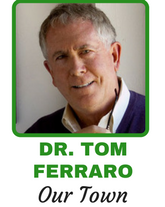Remembering the dead
(Photo with caption “Memorial Day is a time to say a belated ‘thank you’ to all who have sacrificed.”)
Towards the end of the film “Saving Private Ryan” about World War II, the dying Captain Miller (played by Tom Hanks) whispers the words “earn it” into the ear of Private Ryan (played by Matt Damon.) This moving scene incorporates much that needs to be understood about Memorial Day. It suggests the courage of sacrifice and carries with it a sacred request that the sacrifice is appreciated and earned in some way.
We celebrate Memorial Day on the last Monday in May as a way of honoring our military as well as all the others we have lost along the way. This holiday was originally called Decoration Day and was established in 1868 as a way of celebrating all those lost during the Civil War.
Death is always a reckoning and the greatest of dreads all humans face. No one is in a hurry to meet with the Grim Reaper. World War I was the most devastating of all wars up to that point in history with about 40 million fatalities over a four-year period. That was so gruesome that it is no surprise that it changed the way books were written since then. The deaths gave birth to “modernism” in literature, the best examples include “Mrs. Dalloway” by Virginia Woolf, “Ulysses” by James Joyce, Aldous Huxley’s “Brave New World,” T.S. Eliot’s “The Wasteland” and “A Farewell to Arms” by Ernest Hemingway. In each of these works there is a somber internal and private struggle to cope with loss, destruction and fragmentation.
********
But artists are not the only ones who have tried to manage death. Years ago Bob Lipsyte, sports writer for The New York Times, did a series called NASCAR Nation where he asked me to make some comments about the race cars drivers’ relationship with death. I think the week before Dale Earnhardt had died in a crash at the Daytona 500 and so death was in the air.
I recall telling him that as Ernest Becker wrote in “The Denial of Death,” we all want to prove our value by demonstrating heroics and NASCAR was a good example of heroics in action. I told him that athletes manage their fear of death by pushing hard against it. Fear is converted into thrill and by so doing sports becomes a denial of death.
This kind of counterphobic behavior is common in sports like NASCAR, football, hockey, lacrosse, horse racing, rugby, boxing and gymnastics where physical injury is an ever present danger. The athletes get right up into the face of injury and death and this is one reason these sports are so thrilling to watch and why the athletes deserve all the applause they receive.
In this way heroism is a handmaiden of death and why the phrase “earn it’ had such an emotional impact when we witnessed Captain Miller sacrifice his life for Private Ryan. It was as if death itself was whispering into the ear of Private Ryan and telling him that his life came with a cost and a price.
The phrase ‘earn it’ was ambiguous and reminds me of the Robert Frost poem “A Question” which reads as follows:
“A voice said, Look me in the stars
And tell me truly, men of earth,
If all the soul-and-body scars
Were not too much to pay for birth.”
Yes, we all pay for our lives with “soul-and-body scars” as we live but far more has been felt by those who sacrificed so that we may live. I am referring here not only to the heroic soldiers and police and firefighters who gave their lives but to all the parents of all the children on this earth. Yes, soldiers and firefighters and athletes are our modern-day heroes for sure. But let us not forget our parents who gave and gave and then gave some more each and every day to feed and clothe the kids in the home.
My family was a typical one with five kids. We started out in Bayside, Queens, and migrated to Nassau County where we lived in the heart of suburbia. So how did we all make it? Well, let’s see. I recall my mother cooking breakfast, making lunch and then cooking dinner seven days a week, for perhaps 30 years or until the last of us left for college. She was the one who also did all the laundry, changed all the sheets and made all the beds each day.
I recall my father getting up at 6 a.m. every day and schlepping into work on the Long Island Rail Road. Now let me think. How many times did I say thank you to either of them? Maybe zero times. Yet they kept on sacrificing and sacrificing for us. So in answer to the question that Captain Miller asked to Private Ryan, I surly hope that I have earned the joyful and privileged life I have been given by my parents, by the military, by the police and even by all the athletes who make life so much fun to experience.
And since I have not said it before let me finally say it now. “Thank you all so very, very much for all the giving, all the sacrifice and all the love.”



